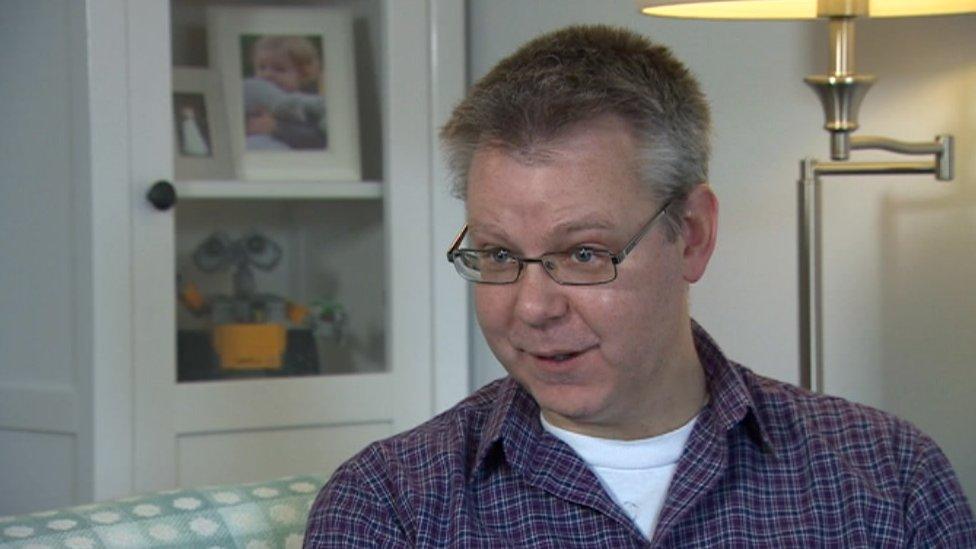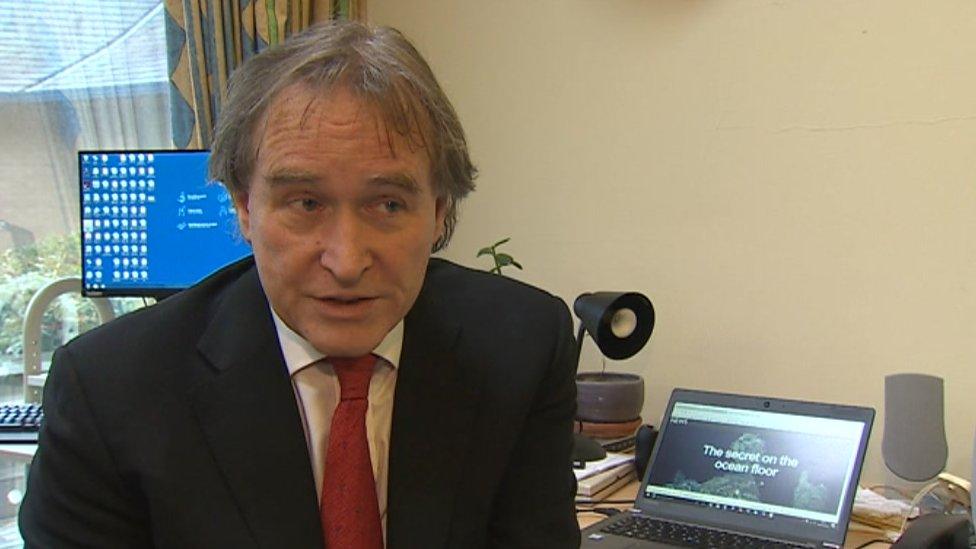Anti-depressants: 'I've lost my identity and who I am'
- Published

James Moore started taking anti-depressants for panic attacks in 2012
"I've lost my job, I've lost my social life, I've lost my career, I've lost my identity and sense of who I am."
James Moore says he 'doesn't feel the same person as before' since becoming hooked on anti-depressants that were prescribed to help ease panic attacks.
The former civil servant said if he had been given a proper warning of the risks, he would never have taken them.
The Welsh Government said it had put in an extra £4 million in psychological therapies in the past two years.
James has been been unable to stop taking the medication since starting it 2012.
The 46-year-old has suffered insomnia, panic, nausea, shaking spells and anxiety during the three times he has tried to come off anti-depressants.
"It has been a huge personal cost to me," said the married father-of-one from Rogiet in Monmouthshire.
"I feel like I'm in the middle of a marathon and I really don't know whether I'm going to get to the end and over the finish line intact or not."

James Moore has suffered anxiety on the three times he has tried to come off anti-depressants
Campaigners in Wales say there is a lack of tailored support and treatment for people struggling with anti-depressant dependency.
People like James, unable to stop taking them, say they have to deal with "devastating" symptoms of withdrawal alone.
A psychiatry professor said the drugs were over-prescribed and patients are not fully aware of the potential risks.
The Royal College of General Practitioners Wales (RCGP), however, said GPs tried to prescribe "in the best interests of patients" and, used appropriately, anti-depressants can be "an effective part of treatment".
But Dr David Healy, professor of psychiatry at Bangor University, said patients were often not told of the risks of dependency as doctors had not been told themselves.

"They haven't been told, for instance, that you can get hooked to these drugs and it may be close to impossible to come off them," he said.
"Back in the late 80s when the drugs came on, first the expectation was you'd be on them for three, maybe six months. The idea they'd be on them for a year, or five years or 10 years was inconceivable back then. But that's what happened," he added.
At the end of last year, campaigners brought a petition calling for action on prescription drug dependence and withdrawal to the Welsh Assembly. They want assembly members to urge the Welsh Government to act.
However, their concerns are disputed by other medical professionals. A major report has been published and found that for many patients, anti-depressants work, although it did not look at long-term use.
Dr Adarsh Shetty, of the Royal College of Psychiatrists in Wales, said: "I see in my routine clinical practice, people who have benefited from them tremendously.

Dr David Healy said patients were often not told of the risks of dependency as doctors had not been told themselves
"So I would really advise people to talk to their doctor, their GP or their psychiatrist if they have any worries about anti-depressants and any concerns about dependence on anti-depressants. It is really important to stress they are not addictive medications."
Dr Jane Fenton-May, of the Royal College of General Practitioners Wales, said GPs always "endeavour to prescribe in the best interests of patients" and "engage patients in a discussion about what is best for them as an individual".
The RCGP said it recognised there was a "lack of alternative treatments", there "can be difficulties in obtaining the necessary support" and supported calls for improvements in this area.
The Welsh Government said "there are a wide range of treatments other than medication available for depression" and it had invested an additional £4m in psychological therapies over the past two years.
"Patients are encouraged to speak with their GP, who would be able to help them make informed decisions about their care", the spokesman added.
- Published22 February 2018

- Published22 February 2018

- Published5 February 2018

- Published24 January 2018

- Published17 August 2017

- Published16 January 2017

- Published19 October 2016
